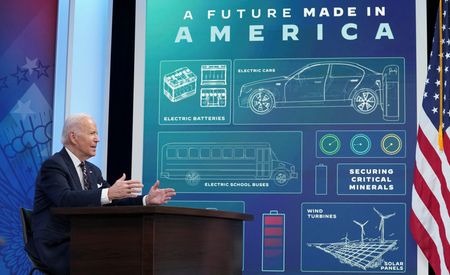By Ernest Scheyder and Steve Holland
WASHINGTON (Reuters) – U.S. President Joe Biden on Tuesday touted progress by government and private industry to boost American production of minerals used to make electric vehicles and other renewable energy products, but stressed that new mines must benefit host communities and not damage the environment.
Washington has grown increasingly concerned that low U.S. production of minerals essential for the construction of future technologies could leave it beholden to China and other nations that have heavily invested in mining.
That has sparked a range of attempts by Biden, as well as his predecessors, to boost U.S. output of lithium, rare earths and other strategic minerals while balancing opposition from environmental and indigenous groups.
“We can’t build a future that’s made in America if we ourselves are dependent on China for the materials that power the products of today and tomorrow,” Biden said at a White House event.
Even still, the president emphasized he would not support new U.S. mines unless “the historical injustices that too many mining operations have left behind” are avoided.
“Environmental protections are paramount,” said Biden. “We have to ensure that these resources actually benefit folks in the communities where they live, not just shareholders.”
Biden, who spoke just after outlining the latest U.S. response to Russian aggression against Ukraine, was joined virtually by industry and labor leaders, as well as California Governor Gavin Newsom. U.S. Energy Secretary Jennifer Granholm and national climate adviser Gina McCarthy joined in person.
STANDARDS
To address environmental concerns, the White House said it would form a committee to recommend changes to the 1872 Mining Law, which has governed hard rock mining across much of the United States since the 19th Century.
Biden also announced a $35 million grant from the U.S. Defense Department to MP Materials Inc to process rare earths, which are used to make magnets found in consumer goods and weapons.
The Pentagon has already awarded roughly $10 million to MP, which controls the only U.S. rare earths mine but depends on China for processing.
The Las Vegas-based company said it will invest $700 million of its own funds and create more than 350 jobs by 2024. The company has said it aims to begin processing rare earths in California by the end of the year.
Jim Litinsky, MP’s chief executive, told Biden the investments will help the company produce enough rare earth products to build 500,000 EVs domestically by 2025.
Additionally, Berkshire Hathaway Energy Renewables said at the event it will break ground this spring on a California facility to test sustainable ways to produce lithium from geothermal brines found underneath California’s Salton Sea and elsewhere.
Biden also announced that the Pentagon plans to boost its stockpile of strategic minerals, a development that Reuters reported last week.
His comments on Tuesday were the clearest to date about the rubric administration officials deploy when determining whether or not to support a proposed U.S. mining project.
“It’s my hope and my expectation that those communities … get the benefit of being able to be employed and being able to generate a living from what’s going to be happening and are protected environmentally,” Biden said.
Last month, the Biden administration blocked a proposed Minnesota copper mine from Antofagasta Plc. It has also taken steps to slow down development of a lithium mine in Nevada from ioneer Ltd and a copper mine in Arizona from Rio Tinto Ltd.
Other announcements at the event included a $140 million pilot project to recover rare earths from coal ash, with funding from the recently passed infrastructure law.
The White House has also touted an agreement between Talon Metals Corp and the United Steelworkers to train workers in northern Minnesota near Talon’s Tamarack nickel project. Talon signed a nickel supply deal with Tesla Inc last month.
Talon has also agreed to remain neutral in any union organizing effort, the White House said. Biden has been a large supporter of organized labor throughout his presidency.
(Reporting by Steve Holland and Jeff Mason in Washington and Ernest Scheyder in Houston; Editing by Robert Birsel and Tim Ahmann)





